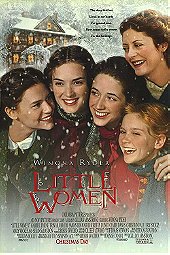Confession: I have never read Little Women. Despite this, the story is one that is so familiar and become such a collected part of the fabric of Americana that I know the story’s general beats, character types, and basic plot. After all, there’s been three major film adaptations, several done on television, and it made a memorable appearance as a topic of discussion in an episode of Friends.
I generally like the warmth, love, and proto-feminist aura that the story provides. Here’s a safe haven for young girls where their intellectual curiosity is not only accounted for but strongly encourage. One where girls band together to make it through life’s various difficulties and grow into the best versions of themselves. Its enduring popularity makes perfect sense to me.
So, here’s 1994’s beloved adaptation with a stellar cast, more emphasis placed on the feminist undertones, and a general vibe of self-esteem, love, support, and nurturing. The warmth found in this movie is intoxicating. It’s a vision of American possibility and hopeful optimism that I want to believe in. It’s also just one hell of a movie.
Walking into this one would expect a soft-edged children’s film made from Louisa May Alcott’s indelible novel of the transition from girlhood to womanhood. Director Gillian Armstrong is instead more preoccupied with crafting the story in as natural a manner as possible. She succeeds from the first frame to the last. When we first visit the March family, huddled together around a modest Christmas Eve celebration during the Civil War, they feel like a real familial unit complete with sibling’s alternating between squabbling and supporting each other and a matron trying to keep it all afloat.
There’s a pleasing, nurturing vibe to this home, and that nostalgic aura projects throughout the rest of the film. Armstrong has managed to make a well-known, well-worn story feel vibrantly alive first through setting an appropriate tone for the material, then by assembling a strong group of actresses for the various parts. It starts with Susan Sarandon as Marmee, who strikes that delicate balance between authority figure and nurturer. It extends to relatively few male figures that appear throughout, such as Christian Bale and Eric Stoltz as the neighbor boy and his tutor, and Gabriel Bryne as a German professor.
Yet the real success of the film is on the ensemble of actresses in the parts of the sisters. Kirsten Dunst gives another preternaturally strong and lived-in performance as the young Amy, while Samantha Mathis’ older Amy feels like the logical outgrowth of Dunst’s, Claire Danes plays the doomed Beth with underlining serenity that makes her exit from the narrative all the tougher to watch. While Trini Alvarado’s Meg is a glimpse of a young actress giving the type of performance that should’ve led to bigger, better roles. It somehow didn’t, but Alvarado’s work matches that of Winona Ryder’s Jo, and that’s no small feat.
Ryder did several more corset/costume dramas during her 90s heyday than you probably remember, and her Jo is one of the strongest performances from that string of films. She’s headstrong, passionate, and smart. She wants to be more than whatever preconceived notions of femininity the era offers her, and she’s forcible enough to walk that path happily. After the more duplicitous and unnervingly still work in The Age of Innocence, Ryder went for the complete opposite here in a dynamic display of her range. She deserved that Best Actress nomination.
If only Little Women hadn’t forced her into a “happy ending” that feels like a concession to social mores of the time. Jo’s engagement to the German professor feels like an after-thought, as I’m sure it probably does in the book, when it’s clear that she would’ve been perfectly happy to go about her life single, childless, and writing up a storm. At least Ryder and Byrne make several small moments leading up the climatic ending feel like a connection of the mind and hearts, as if their relationship will be built upon something more than station, social maneuvering, or finances.
It’s this home stretch of Little Women that gets a bit wonky as Armstrong’s firm grip on the material slackens ever so slightly in spots. It’s easier to manage four girls when they’re all under one roof, but exponentially harder once they start marrying and moving off into their new lives. Still, Armstrong’s film remains remarkably solid, engaging, and hypnotically innocent until the very end. If nothing else, it also gave a generation of girls these words from Marmee: “Time erodes all such beauty, but what it cannot diminish is the wonderful workings of your mind.” That’s enough to give this version of Little Women high marks.
 Login
Login